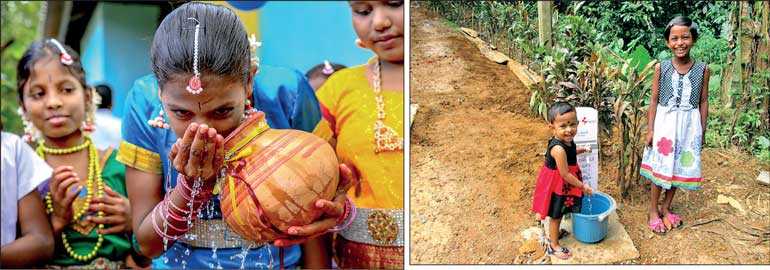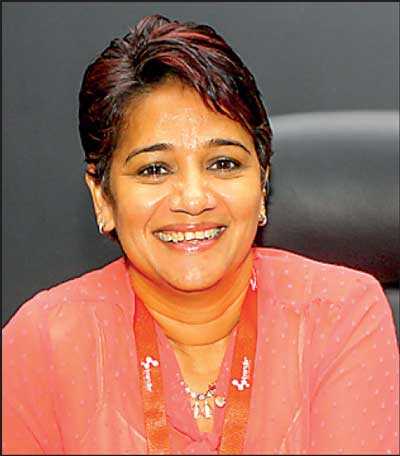Wednesday Feb 18, 2026
Wednesday Feb 18, 2026
Friday, 22 March 2019 00:00 - - {{hitsCtrl.values.hits}}

By Anusha Alles
In 2010, the UN recognised ‘the right to safe and clean drinking water and sanitation as a human right that is essential for the full enjoyment of life and all human rights’. This, without any kind of discrimination, entitles  everyone to safe, acceptable, physically accessible and affordable water for personal and domestic use, including water for drinking, personal sanitation, washing of clothes, food preparation, and personal and household hygiene.
everyone to safe, acceptable, physically accessible and affordable water for personal and domestic use, including water for drinking, personal sanitation, washing of clothes, food preparation, and personal and household hygiene.
Aptly, this year’s World Water Day is centred around the theme of ‘Leaving No One Behind’ – directing the focus towards an inclusive approach that ensures that all people have access to the basic human right of safe water.
With the UN Sustainable Development Goal 6 (SDG 6) being ‘water for all by 2030’, many efforts are being taken to ensure that clean water is provided to those that lack access to this essential resource. However, to complete a task of this significance, it is essential that efforts take on more of a collaborative approach and include likeminded stakeholders and partners that commit their expertise, funds, human resources and strengths for the cause.
Global context
A global analysis conducted by the UN indicates that over 2,000 children aged five and under die every day from a water-related disease, while approximately 783 million people do not have access to clean and safe water worldwide. 19% of the world population without access to water live in India, which amounts to 163 million of the nation’s total population.
Local context
In Sri Lanka itself, two million of the population still lack access to clean drinking water, as stated by the National Water Supply and Drainage Board (NWSDB). More often than not, the primary responsibility of sourcing water for households and families falls on the females, who are compelled to venture on long and precarious journeys and queue up for long periods of time at community wells to collect water for daily basic needs.
This pressing need continues to significantly hinder the lives and livelihoods of these individuals, mostly women, who are unable to pursue jobs and other sources of income, thus, resulting in negatively impacting their overall quality of life and the lives of those in their communities.
In light of this, Sri Lanka has, over the years, embarked on a journey to identify and aid communities that are impacted by a lack of access to safe and clean water. Initiatives by the Government of Sri Lanka as well as the private sector have been focused towards uplifting communities through the provision of clean water for households, schools and other community establishments through collaborative efforts.
Leaving no one behind
In line with this year’s theme for World Water Day, the focus of ‘Leaving No One Behind’ has been expanded into three key pillars – Learn, Share and Act. In a world where we are overwhelmed with an influx of information through easily accessible mediums such as social and digital media, it is imperative that clarity and context is provided on the issues at hand.
Awareness at an extensive level enables all stakeholders, including the communities and the decision makers to be more cognisant of the reality at hand, and thereby initiate more effective action that will benefit those affected by the issue.
Playing an active role through collaboration
As representatives of the corporate sector, there is a significant and impactful role that can be played to address community needs and help alleviate the burden and adversities faced by the community residents in the process.
For example, Sri Lanka’s leading apparel solutions provider Brandix, has since 2006, actively engaged with its employees across its local network to correctly assess and identify the issues that impact their lives and the lives of their communities. This enabled the company to understand that at the time 90% of its employee base, which consisted primarily of women, were impacted at some level or the other by a lack of access to clean water. This issue inevitably hampered their lives where the females were unable to attend work, thus impeding their ability to earn an income to sustain their families.
In an effort to make a positive contribution to the communities in which they operate through systematic interventions, and simultaneously address acute social needs that are considered national priorities, Brandix conducts the ‘Care For Our Own’ and ‘Model Village’ initiatives to meet the immediate water needs of its employees and their surrounding communities.
Water is a scarce resource in India and Bangladesh, two of the countries in which Brandix operates. Sri Lanka too has been feeling the effects of water shortages caused by extreme drought conditions that have plagued the country in recent years.
Since water requirements are met through municipal sources in these countries, growing businesses are likely to put a strain on local water resources surrounding factory sites. This is why companies like Brandix continue to take aggressive action to control the Group’s impact on the local water environment.
Brandix follows a simple model that underpins its community efforts through four key focus areas - Provide, Educate, Research and Disaster Management. Further to ensure that resources allocated for each project achieve the expected results, systematic monitoring followed by careful evaluation of project outcomes are done to measure their actual impact versus the desired targets.
The community investment strategy of Brandix is brought to life by two co-dependent aspects: community engagement and employee volunteerism. Community engagement ensures Brandix stays connected with the various local communities in and around its work sites while employee volunteerism paves way for employees to connect with their local communities, understand their needs, and respond positively to make a meaningful contribution for the betterment of society.
Collaborations to secure safe drinking water: Kelani River Multi-stakeholder Partnership (KRMP)
The Kelani River Multi-stakeholder Partnership (KRMP) is a sustainable development initiative to balance the development of livelihoods, community and industry, as well as ensure the safety of drinking water sources for the communities who live along the Kelani River. The Kelani River basin is home to 25% of Sri Lanka’s population and provides drinking water for a rapidly expanding population of over three million, for Colombo and Greater Colombo areas. Simultaneously, the river basin supports industry, agriculture, plantations and several thousands of livelihoods. Despite its significance to Sri Lanka, it is the most polluted river basin in the country, thereby threatening the safety of drinking water sources.
Due to the complexity and multi-sector nature of the issues involved in the Kelani River Basin, the International Union for Conservation of Nature (IUCN), in early 2016, initiated the KRMP project as a private-public-community partnership to ensure the river basin’s sustainable development for present and future generations, with funding from UNICEF, under the guidance of the Central Environment Authority (CEA) and with the participation of over 50 agencies. The KRMP approach has been endorsed by the Government of Sri Lanka, through several Ministries and Government Agencies.
Multiple stakeholders, including organisations such as Brandix, have actively come onboard to support this initiative through funds and expertise to ensure water security for the communities in and around the Kelani River.
Initiatives such as these are indicative of the broader social impact that can take place through strategic collaborations to address social and community issues at hand.
(The writer is Head of Corporate Social Responsibility, Brandix Apparel Ltd.)